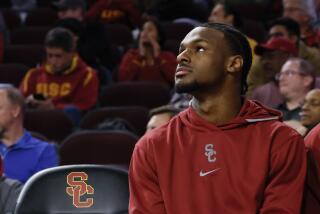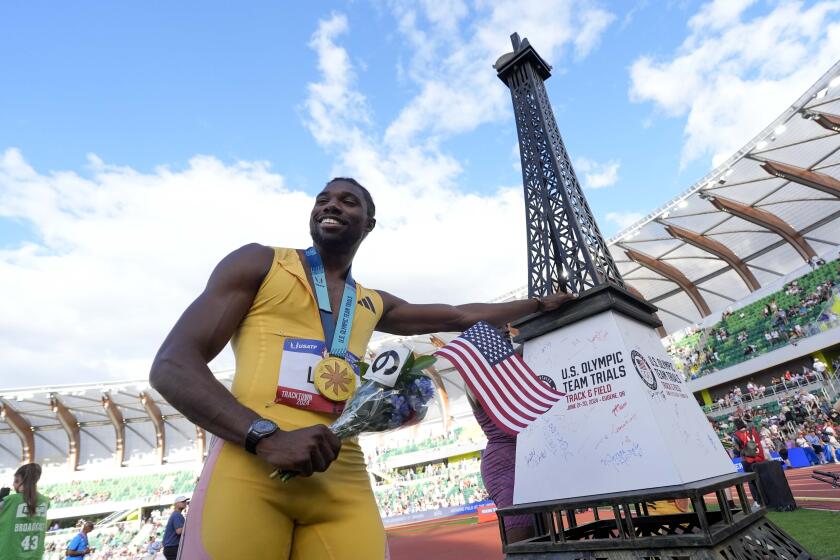Liberty Is Where Rutigliano Now Pursues Happiness
Ten years ago, the Rev. Jerry Falwell hired Sam Rutigliano and predicted that the former Cleveland Browns coach would deliver Liberty to the same football promised land as Notre Dame.
Ten years later, with the Baptist college still in Division I-AA, Rutigliano roars with laughter at that prediction.
“I’ll be in a nursing home when they play Notre Dame,” he said. “Though last year we did that. Our volleyball team played Notre Dame. So Jerry’s not a false prophet.”
Liberty, Rutigliano and Falwell, the school’s founder, have been through tough times together. Not long after Rutigliano’s hiring, creditors threatened to shut down the school.
“The bottom fell out,” Rutigliano said. “That’s when I made the decision not to whine or moan or leave. I went out there and started recruiting, getting people to contribute to football.”
Rutigliano estimated he raised $3.5 million for the program and still acts as a part-time groundskeeper and janitor.
“Which was not part of the deal,” Rutigliano said with a sly smile. “I tell Jerry all the time that Liberty has taken a vow of poverty: we take the poverty, he takes the vow.”
Starting the 1998 season, the Flames were 58-40 under Rutigliano, the most victories by any coach in the school’s 27-year history. Liberty finished last season ranked 20th nationally, but it has never reached the I-AA playoffs.
Liberty is not in a conference, so it must impress the NCAA selection committee rather than earn a playoff berth with a conference title. Weak schedules with such teams as Concord, West Virginia Tech and Glenville State have always hurt the Flames.
This season, Liberty plays four teams ranked in the Division I-AA top 25 last season and two that are preparing to move up to I-A.
Liberty’s lifestyle can be a tough sell for a lot of recruits, Rutigliano said. The school bans tobacco and alcohol; men must wear ties on campus; there are no coed dorms; all students must attend chapel daily; and curfew is strictly enforced.
The 65-year-old Rutigliano has no second thoughts about coming to the school or staying. But the job is a far cry from the lofty post he once held.
Rutigliano became the Browns coach in 1978 after 11 years as an assistant with four NFL teams. In 1980, the Browns won the AFC Central Division, and Rutigliano was named the NFL coach of the year. Four years later, he was fired midway through the season.
“I was not to grow old in that endeavor,” Rutigliano said. He summed it up by quoting former Houston Oilers and New Orleans Saints coach Bum Phillips: “The first day you get hired is a day closer to you getting fired.”
Rutigliano spent the next four years as a TV color commentator, wrote a book and hit the motivational-speakers circuit, meeting Falwell at a gathering of religious broadcasters.
He declined Falwell’s first invitation to return to coaching. But after visiting the school, Rutigliano felt the pull of his faith.
The trappings are certainly different than those in the NFL. There is no private parking in front of his office; he scrounges for a space wherever he can find it.
One afternoon during the preseason, the team’s washing machine broke down. Hours later, he learned that the air conditioning had gone out in the press box where the team eats. Chartered flights and luxury hotels are out. Bus trips and cheap motels are the rule.
“It is such a major, major change in the so-called ego part of me, but I have never been more happy or fulfilled, just satisfied,” the coach says.
Those who play for him leave with the same sense of belonging and contentment.
“It’s a family here, and Sam is a good father-figure, a man you can go to for guidance,” said Ben Anderson, last year’s quarterback.
Anderson, visiting practice three days after being cut by the New York Giants, has returned to Lynchburg to decide whether to attend medical school.
On the practice field in the 100-degree heat, Rutigliano is everywhere, speaking to players by their first names and calmly correcting an attitude or technique.
In a one-on-one blocking drill, a linebacker and running back begin fighting. As teammates pull them apart, Rutigliano waits. The combatants, each restrained by several teammates, glare at each other.
Rutigliano walks between them, reaches up to grab each by a shoulder pad and begins speaking softly. After several minutes, the players smile, shake hands and one says, “Thanks, coach Sam.”
Rutigliano flashes a small smile to a bystander and whispers, “You got to love this game.”
More to Read
Get our high school sports newsletter
Prep Rally is devoted to the SoCal high school sports experience, bringing you scores, stories and a behind-the-scenes look at what makes prep sports so popular.
You may occasionally receive promotional content from the Los Angeles Times.






